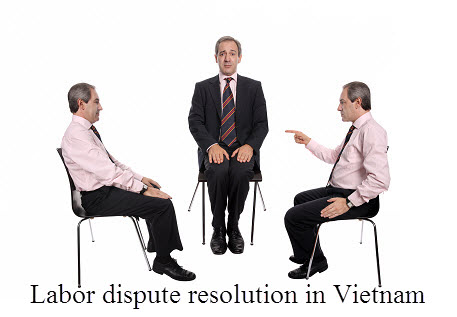Labor dispute resolution in Vietnam
The procedure of labor dispute resolution in Vietnam
Post date: 11-04-2014
10,337 view(s)
Definitions of labor dispute resolution in Vietnam.
- Labour dispute means a dispute [or disagreement] about rights, obligations and benefits arising between parties in a labour relationship.
- Labour disputes comprise individual labour disputes between an employee and employer, and collective labour disputes between the labour collective and the employer.

Labor dispute resolution in Vietnam
Labor dispute in Vietnam is resolved by the following steps: 1).Negotiation; 2).Reconciliation; 3).Court’s judgment.
1. Labor dispute resolution by negotiation in Vietnam:
- Vietnamese labor laws respect for and guarantee of the principle that the parties engage in direct negotiation and reach their own decision on settlement of the labour dispute.
- Resolution of a labour dispute must, first and foremost, be based on direct negotiation between the two parties aimed at reaching a harmonious solution of the interests of the two parties to the dispute, stabilizing production and business, and ensuring social order and safety.
2. Labor dispute resolution by reconciliation in Vietnam:
2.1 Principles for resolution of labour disputes in Vietnam
- Ensuring conciliation and arbitration are held on the basis of mutual respect of the rights and benefits of the two disputing parties, respect of general social interests, and compliance with law.
- Ensuring participation of representatives of the parties during the process of resolution of the labour dispute.
- A labour dispute shall be resolved by an agency, organization or individual authorized to conduct labour dispute resolution if one of the two parties files a petition [for resolution] because the other refused to conduct negotiation, if negotiation was conducted but was unsuccessful, or if negotiation was successful but a party failed to implement [the agreement reached].
2.2. Conciliation of individual labor disputes in Vietnam:
a. An individual labour dispute must pass through procedures for conciliation by a labour conciliator prior to a petition to a court to resolve the dispute, except for the following labour disputes for which it is not mandatory to conduct conciliation procedures:
- A dispute relating to the disciplinary measure of dismissal for breach of the law on labour, or a dispute arising from unilateral termination of a labour contract;
- A dispute relating to payment of compensation for loss and damage, or payment of allowances upon termination of a labour contract;
- A dispute between a domestic servant and the employer;
- A dispute relating to social insurance in accordance with the law on social insurance, or health insurance in accordance with the law on health insurance;
- A dispute relating to payment of compensation for loss and damage between an employee and an enterprise or professional entity sending a worker to work overseas pursuant to a contract.
b.A conciliator must terminate the conciliation within five (5) working days from the date of receipt of the request for conciliation.
c.The two disputing parties must be present at a conciliation session but may appoint authorized representatives to participate at the conciliation session [on their behalf].
The labour conciliator is responsible to guide the parties in their negotiations, and if the two parties
reach a settlement then the labour conciliator shall prepare minutes of settlement.
In the event that the two parties do not reach a settlement, the labour conciliator shall provide a settlement proposal for consideration by the two parties. If the two parties agree to the settlement proposal, then the labour conciliator shall prepare minutes of successful conciliation.
If the two parties to the dispute fail to agree on the settlement proposal, or if one of the parties has been validly summonsed twice but is still absent without a legitimate reason, then the labour conciliator shall prepare minutes of unsuccessful conciliation.
The minutes shall be signed by the parties in dispute who were present and also by the labour
conciliator.
Copies of minutes of settlement or minutes of unsuccessful conciliation must be sent to the two disputing parties within one working day after the date of preparation of such minutes.
2.3. Conciliation of collective labor disputes in Vietnam:
a. The order for conciliation of a collective labour dispute shall be implemented in accordance with the provisions in article 2.2 mentioned above. Minutes of conciliation must specify the type of collective labour dispute.
b. If a concilliation is unsuccessful or if either of the parties fails to implement the agreement set out in the minutes of successful conciliation, then the following provision applies:
- In the case of a collective labour dispute about rights, the parties have the right to petition the chairman of the district people”s committee to resolve the dispute;
- In the case of a collective labour dispute about benefits, the parties have the right to petition a labour arbitration council to resolve the dispute.
c. If on expiry of the time-limit for resolution stipulated in article 2.2.b mentioned above, the labour conciliator has not conducted a concilliation, the parties have the right to petition the chairman of the district people”s committee to resolve the dispute.
The chairman of the district people”s committee is responsible, within two (2) working days from receipt of a petition, to determine whether the dispute is one about rights or one about benefits.
3. Labor dispute resolution by Court in Vietnam:
a. A labour dispute shall be resolved by the Court to conduct labour dispute resolution if one of the two parties files a petition [for resolution] because the other refused to conduct negotiation, if negotiation was conducted but was unsuccessful, or if negotiation was successful but a party failed to implement [the agreement reached].
b. In the event of an unsuccessful conciliation, or if one of the parties fails to implement the agreement set out in the minutes of successful conciliation, or if on expiry of the time-limit for conciliation stipulated in clause 2 of this article the labour conciliator has not conducted a conciliation, each disputing party has the right to petition the people”s court to resolve the dispute.
Lawyervn.net














Send your comment